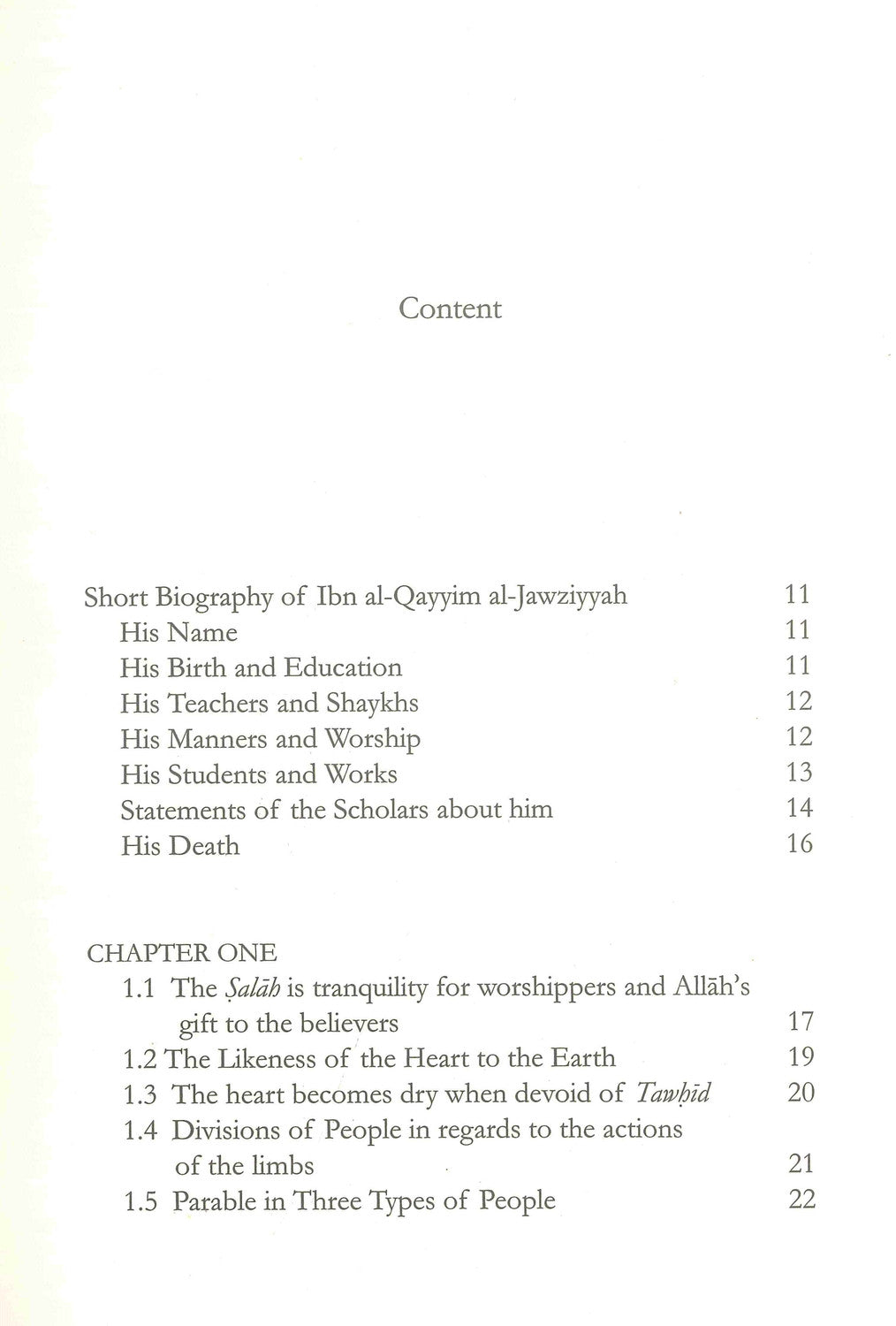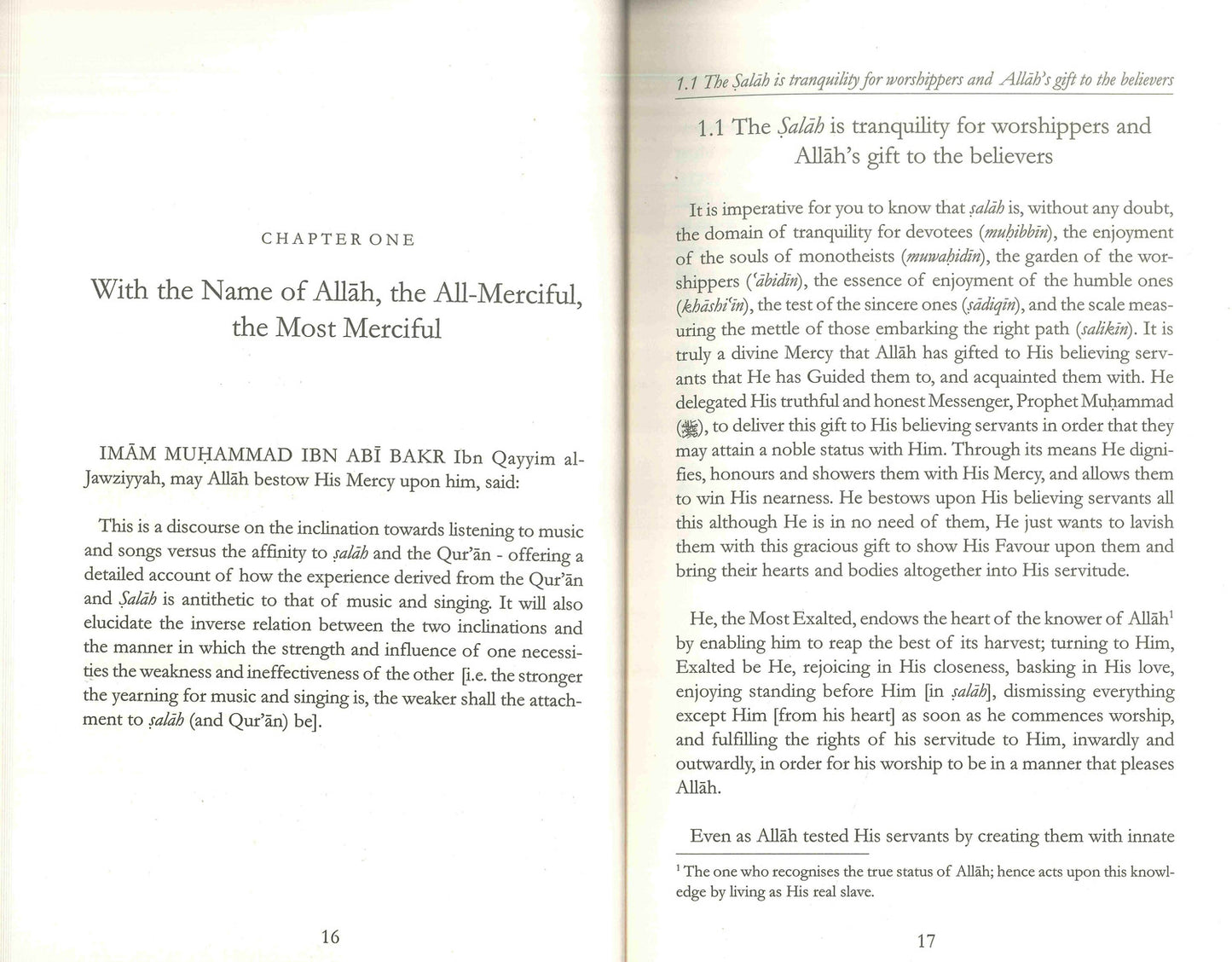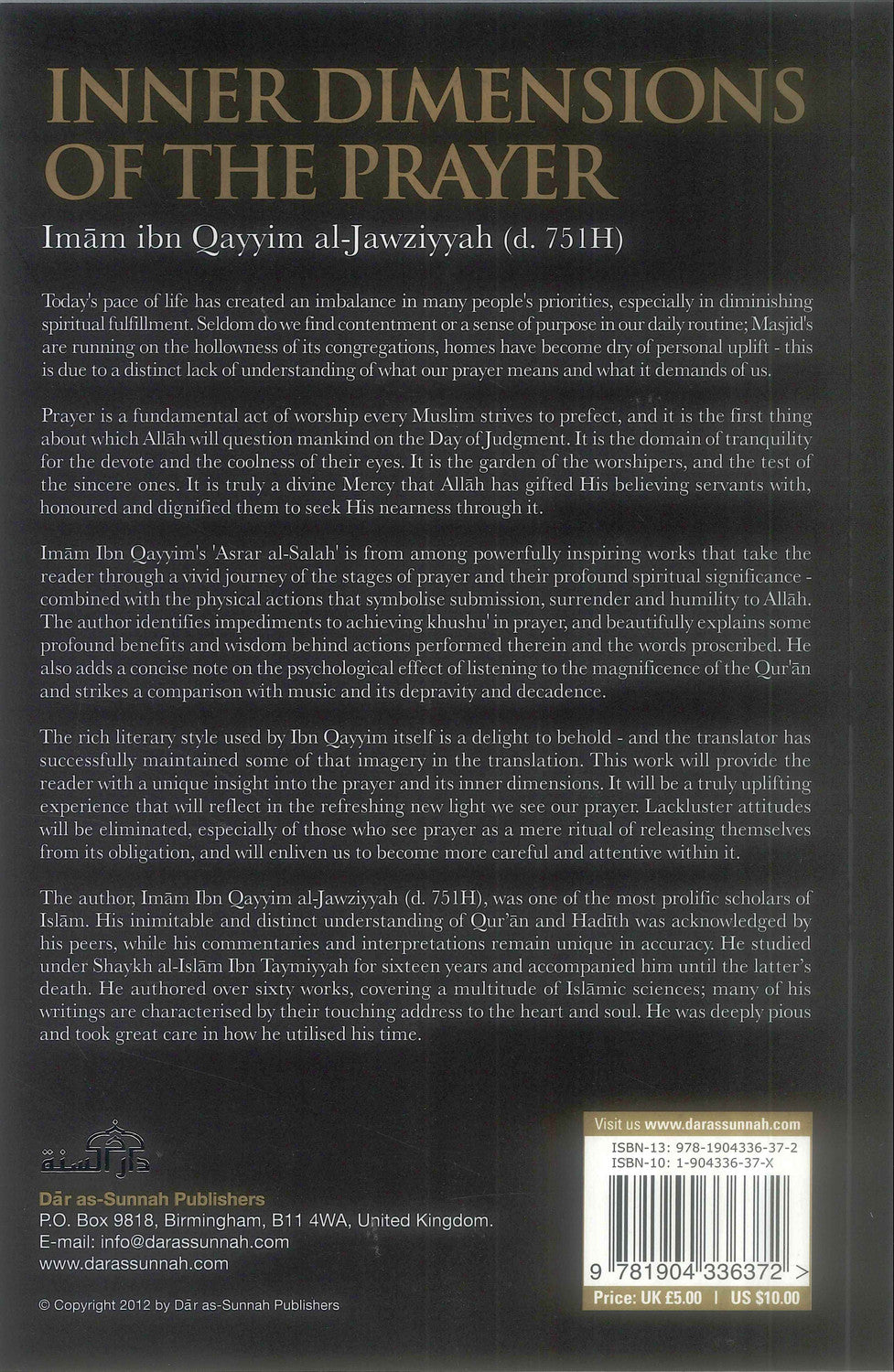Inner Dimensions of the Prayer By Imam Ibn Qayyim al_jawziyyah
Inner Dimensions of the Prayer By Imam Ibn Qayyim al_jawziyyah
Publisher:
Dar As Sunnah Publications
Author:
Imam Ibn Qayyim al-Jawziyyah
Language:
English
Binding:
Soft Cover
Pages: 96
Size: A5 |5.8 x 8.3 in| 14.8x 21 cm
Couldn't load pickup availability




Collapsible content
Description of Book
Inner Dimensions of the Prayer
In today's fast-paced society, many individuals struggle with maintaining a balance in their priorities, leading to a lack of spiritual fulfillment. It is rare to find contentment or a sense of purpose in our daily routines; even mosques are facing a decline in their congregations, and homes have become void of personal growth. This is largely due to a lack of understanding of the true meaning and demands of prayer. Prayer is a vital act of worship that each and every Muslim strives to perfect, and it is the first thing mankind will be questioned about on the Day of Judgment. It serves as a source of tranquility for the devout and the delight of their eyes. It is a sacred garden for worshippers and a test for the sincere. It is a divine mercy bestowed upon believers by Allah, who has honored and dignified them by allowing them to seek His closeness through prayer. 'Asrar al-Salah' by Imam Ibn Qayyim is a powerful and inspiring work that takes the reader
Publisher
Dar As Sunnah Publications
Author
- Imam Ibn Qayyim al-Jawziyyah
Sample Pages - Content
Page : 01
DAR AS-SUNNAH CLASSIC COLLECTION INNER DIMENSIONS OF THE PRAYER Imām ibn Qayyim al-Jawziyyah (d. 751H)
Page : 02
Content Short Biography of Ibn al-Qayyim al-Jawziyyah His Name His Birth and Education 11 11 11 His Teachers and Shaykhs 12 His Manners and Worship His Students and Works His Death 12 13 Statements of the Scholars about him 349 14 16 17 19 5220 CHAPTER ONE 1.1 The Salah is tranquility for worshippers and Allāh's gift to the believers 1.2 The Likeness of the Heart to the Earth 1.3 The heart becomes dry when devoid of Tawhid 1.4 Divisions of People in regards to the actions of the limbs 1.5 Parable in Three Types of People 2223 21
Page : 03
CHAPTER ONE With the Name of Allāh, the All-Merciful, the Most Merciful IMAM MUHAMMAD IBN ABI BAKR Ibn Qayyim al- Jawziyyah, may Allah bestow His Mercy upon him, said: This is a discourse on the inclination towards listening to music and songs versus the affinity to salah and the Qur'an - offering a detailed account of how the experience derived from the Qur'an and Salah is antithetic to that of music and singing. It will also elucidate the inverse relation between the two inclinations and the manner in which the strength and influence of one necessi- ties the weakness and ineffectiveness of the other [i.e. the stronger the yearning for music and singing is, the weaker shall the attach- ment to salah (and Qur'an) be]. 16 1.1 The Salah is tranquility for worshippers and Allah's gift to the believers 1.1 The Salah is tranquility for worshippers and Allah's gift to the believers It is imperative for you to know that salah is, without any doubt, the domain of tranquility for devotees (muhibbin), the enjoyment of the souls of monotheists (muwaḥidin), the garden of the wor- shippers ('abidin), the essence of enjoyment of the humble ones (khashi'in), the test of the sincere ones (sadiqin), and the scale meas- uring the mettle of those embarking the right path (salikin). It is truly a divine Mercy that Allah has gifted to His believing serv- ants that He has Guided them to, and acquainted them with. He delegated His truthful and honest Messenger, Prophet Muhammad (), to deliver this gift to His believing servants in order that they may attain a noble status with Him. Through its means He digni- fies, honours and showers them with His Mercy, and allows them to win His nearness. He bestows upon His believing servants all this although He is in no need of them, He just wants to lavish them with this gracious gift to show His Favour upon them and bring their hearts and bodies altogether into His servitude. He, the Most Exalted, endows the heart of the knower of Allāh1 by enabling him to reap the best of its harvest; turning to Him, Exalted be He, rejoicing in His closeness, basking in His love, enjoying standing before Him [in salah], dismissing everything except Him [from his heart] as soon as he commences worship, and fulfilling the rights of his servitude to Him, inwardly and outwardly, in order for his worship to be in a manner that pleases Allāh. Even as Allah tested His servants by creating them with innate The one who recognises the true status of Allah; hence acts upon this knowl- edge by living as His real slave. 17
Page : 04
INNER DIMENSIONS OF THE PRAYER Imām ibn Qayyim al-Jawziyyah (d. 751H) Today's pace of life has created an imbalance in many people's priorities, especially in diminishing spiritual fulfillment. Seldom do we find contentment or a sense of purpose in our daily routine; Masjid's are running on the hollowness of its congregations, homes have become dry of personal uplift - this is due to a distinct lack of understanding of what our prayer means and what it demands of us. Prayer is a fundamental act of worship every Muslim strives to prefect, and it is the first thing about which Allah will question mankind on the Day of Judgment. It is the domain of tranquility for the devote and the coolness of their eyes. It is the garden of the worshipers, and the test of the sincere ones. It is truly a divine Mercy that Allah has gifted His believing servants with, honoured and dignified them to seek His nearness through it. Imam Ibn Qayyim's 'Asrar al-Salah' is from among powerfully inspiring works that take the reader through a vivid journey of the stages of prayer and their profound spiritual significance - combined with the physical actions that symbolise submission, surrender and humility to Allah. The author identifies impediments to achieving khushu' in prayer, and beautifully explains some profound benefits and wisdom behind actions performed therein and the words proscribed. He also adds a concise note on the psychological effect of listening to the magnificence of the Qur'an and strikes a comparison with music and its depravity and decadence. The rich literary style used by Ibn Qayyim itself is a delight to behold - and the translator has successfully maintained some of that imagery in the translation. This work will provide the reader with a unique insight into the prayer and its inner dimensions. It will be a truly uplifting experience that will reflect in the refreshing new light we see our prayer. Lackluster attitudes will be eliminated, especially of those who see prayer as a mere ritual of releasing themselves from its obligation, and will enliven us to become more careful and attentive within it. The author, Imam Ibn Qayyim al-Jawziyyah (d. 751H), was one of the most prolific scholars of Islam. His inimitable and distinct understanding of Qur'an and Hadith was acknowledged by his peers, while his commentaries and interpretations remain unique in accuracy. He studied under Shaykh al-Islam Ibn Taymiyyah for sixteen years and accompanied him until the latter's death. He authored over sixty works, covering a multitude of Islamic sciences; many of his writings are characterised by their touching address to the heart and soul. He was deeply pious and took great care in how he utilised his time. Visit us www.darassunnah.com ISBN-13: 978-1904336-37-2 ISBN-10: 1-904336-37-X Där as-Sunnah Publishers P.O. Box 9818, Birmingham, B11 4WA, United Kingdom. E-mail: info@darassunnah.com www.darassunnah.com Copyright 2012 by Dar as-Sunnah Publishers 9 781904 336372> Price: UK £5.00 US $10.00
Imam Ibn Qayyim al_jawziyyah
Imam Ibn Qayyim al-Jawziyyah (1292–1350 CE) was a prominent Islamic scholar, theologian, and jurist, best known for his profound works on spirituality, Islamic law, and ethics. As a student of Ibn Taymiyyah, he emphasized returning to the Quran and Sunnah, focusing on purifying the heart and deepening one's relationship with Allah. His influential works, like Madarij as-Salikin (The Stages of the Seekers) and Zad al-Ma'ad (Provisions for the Hereafter), explore the journey of the soul, human psychology, and the wisdom of divine commands. Ibn al-Qayyim’s insights continue to inspire Muslims toward personal growth, sincerity, and inner peace.




